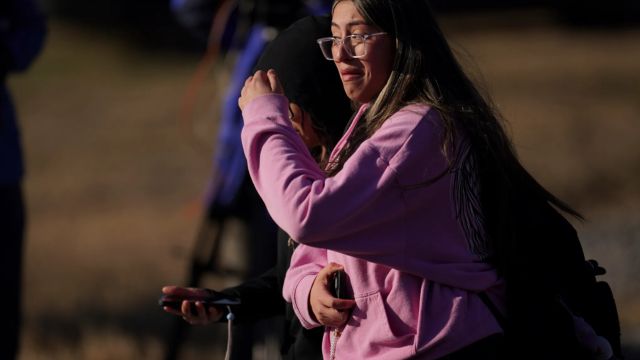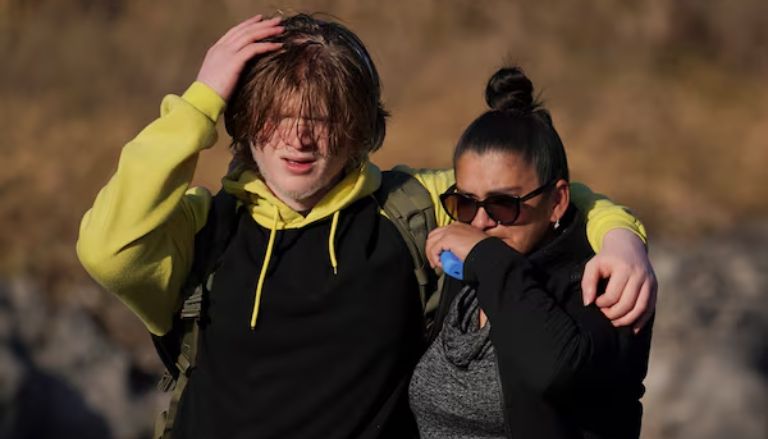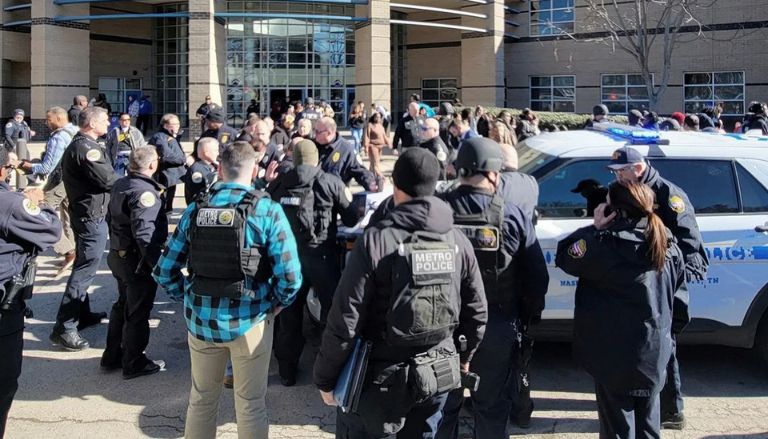Nashville, Tennessee — A female student was killed and another student was injured in a shooting at a Nashville high school cafeteria on Wednesday, nearly two years after another deadly school shooting in the city sparked an intense discussion about gun regulation in Tennessee.
The 17-year-old shooter, who also attended Antioch High School, later shot and killed himself with a firearm, Metro Nashville Police spokesperson Don Aaron said during a news conference. Solomon Henderson was identified by police.
Police Chief John Drake stated that the shooter “confronted” student Josselin Corea Escalante, 16, in the cafeteria and fired fire, killing her.
A gunshot grazed the wounded student. He was treated and released from the hospital, Drake stated. Another kid was sent to the hospital for treatment of a face injury sustained during a fall, Aaron added.
Metro Nashville Police, federal and state agencies are investigating “very concerning online writings and social media posts connected to 17-year-old Solomon Henderson” as they attempt to determine a motive, according to a statement released Wednesday evening.
Investigators have not established a link between Henderson and the victims, and police believe the firing was random, according to the statement.
According to Aaron, two school resource officers were present when the incident occurred at 11 a.m. They were not in the near vicinity of the cafeteria, and by the time they arrived, the shooting had stopped and the gunman had committed suicide, Aaron added.
The school serves approximately 2,000 students and is located in Antioch, a community about 10 miles (16 kilometers) southeast of downtown Nashville.
Officials from a family safety center near a hospital assisted stunned parents in reuniting with their children.
Dajuan Bernard was waiting at a Mapco service station to reunite with his son, a 10th grader who was being kept in the auditorium with other pupils on Wednesday afternoon. Bernard learned about the incident from his son, who “was a little startled,” Bernard added. His son was upstairs from the café, but he reported hearing gunfire.
“He was fine and assured me that everything was fine,” Bernard added.
“This world is so crazy, it could happen anywhere,” according to him. “We just have to safeguard the kids and raise them properly to avoid them from doing this. That’s the hardest thing.”
Fonda Abner stated that her granddaughter had called her a few times, but she only heard activity and assumed it was a pocket dial. They talked briefly before being cut off.
“It’s nerve-racking waiting out here,” Abner explained.
United Family Fellowship, a church in Antioch, was holding a vigil Wednesday night “for anyone in the community who needs a space to pray, process, and find comfort,” according to their Facebook page.
Adrienne Battle, superintendent of Nashville schools, stated earlier Wednesday that public schools have implemented a “range of safety measures,” including partnerships with police for school resource officers, security cameras with weapon detection software, shatter-resistant glass film, and security vestibules that serve as a barrier between outside visitors and the main entrance.
“Unfortunately, these measures were not enough to stop this tragedy,” Battle told the crowd.
She stated there are concerns over whether stationary metal detectors should be used.
“While past research has shown they have had limitations and unintended consequences, we will continue to explore emerging technologies and strategies to strengthen school safety,” Battle told the audience.
In October, a 16-year-old Antioch High School student was detained after school resource officers and administrators learned via social media that he had brought a gun to school the day before. When he was stopped the next morning, cops discovered a loaded revolver in his jeans.
Nearly two years ago, a shooter opened fire at a separate Nashville private elementary school, killing six people, three of whom were children.
The tragedy triggered a months-long campaign by hundreds of community organizers, families, protestors, and others to urge lawmakers to consider passing gun control legislation.
Republican lawmakers in the state with the most Republicans declined to do so. With the Republican supermajority still intact following the November election, it seems unlikely that opinions have shifted enough to warrant consideration of any substantial gun control legislation.
Instead, lawmakers have been more inclined to increasing school security, including adopting a bill last year that would let some teachers and staff to carry concealed handguns on public school premises while preventing parents and other teachers from knowing who was armed.
Antioch, a booming and diverse neighborhood in Nashville, has had several high-profile shootings in recent years. A tragic shooting at Burnette Chapel Church of Christ in 2017 left one woman dead and seven others injured. In 2018, a gunman killed four people at a Waffle House.

Shaundelle Brooks, a state representative, ran for office in large part because her son was killed in the Waffle House shooting and was elected last year following the Covenant shooting. She said the Antioch High School massacre highlights the need for gun control changes. “We must do better,” she stated.
“Ever since I lost my son, Akilah, in a mass shooting in 2018, I have been fighting to ensure that this never happens again,” the Nashville Democrat said in a statement. “Here we are almost 7 years later, and our communities are still being impacted by gun violence.”
Samantha Dickerson had confiscated her 14-year-old son’s phone as a punishment, so when she received a message from his school about the shooting, she had no way to contact him.
“I was nervous,” she said. “I really was about to break down.”
After three hours of waiting, she received a call from his English teacher and spoke with her son.
“When I heard his voice, I just broke down and started crying,” she told me.







Leave a Comment